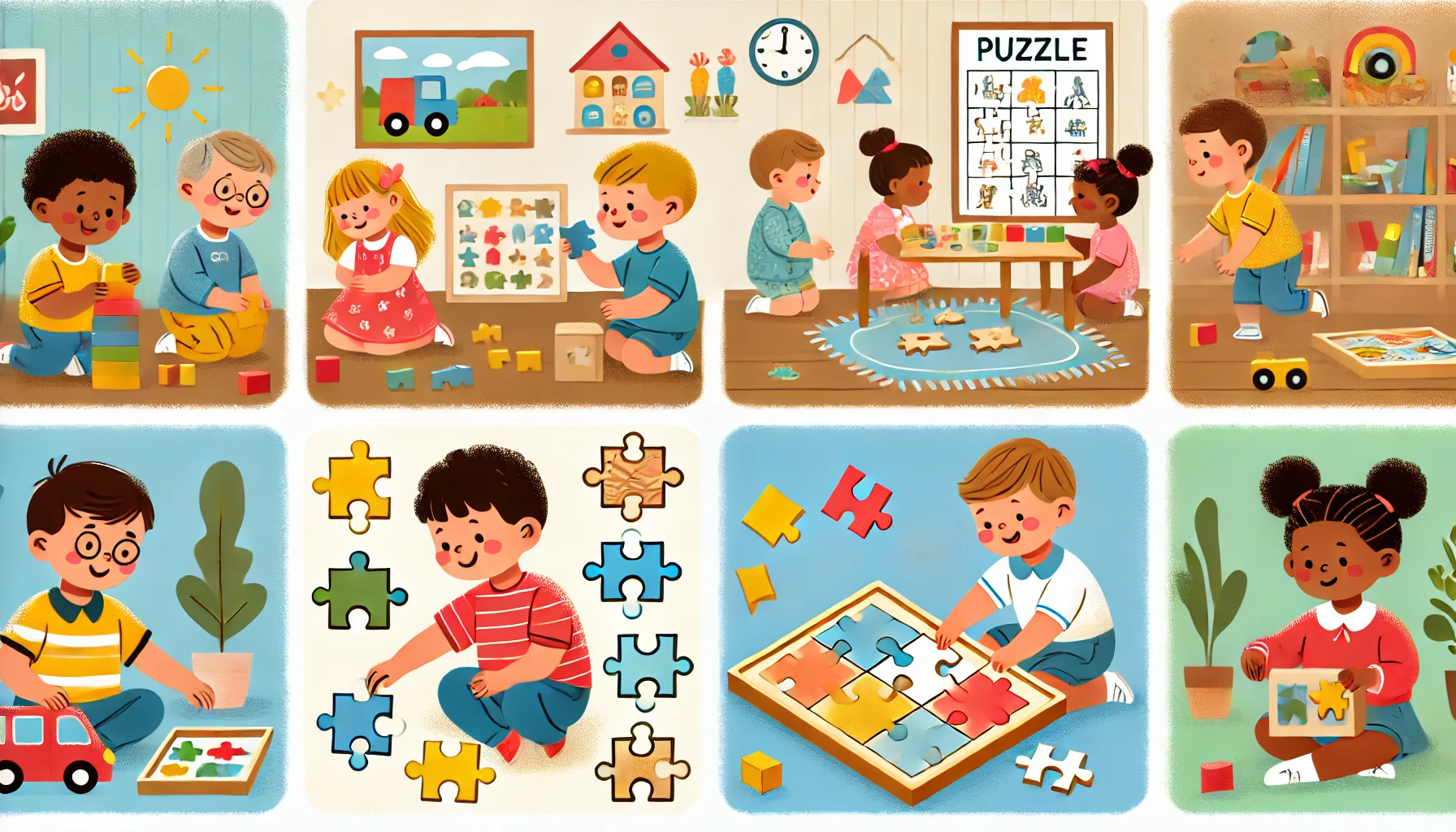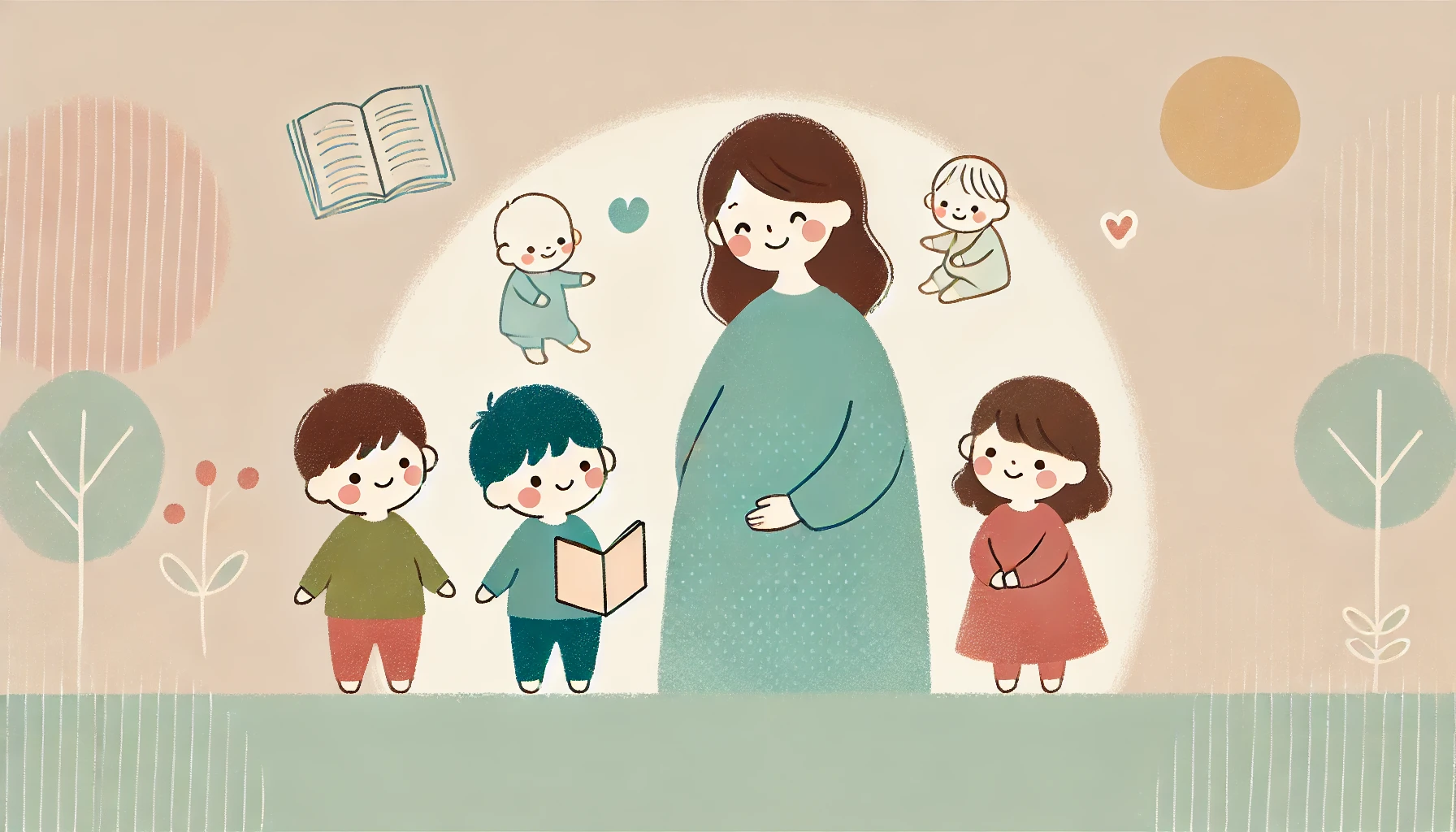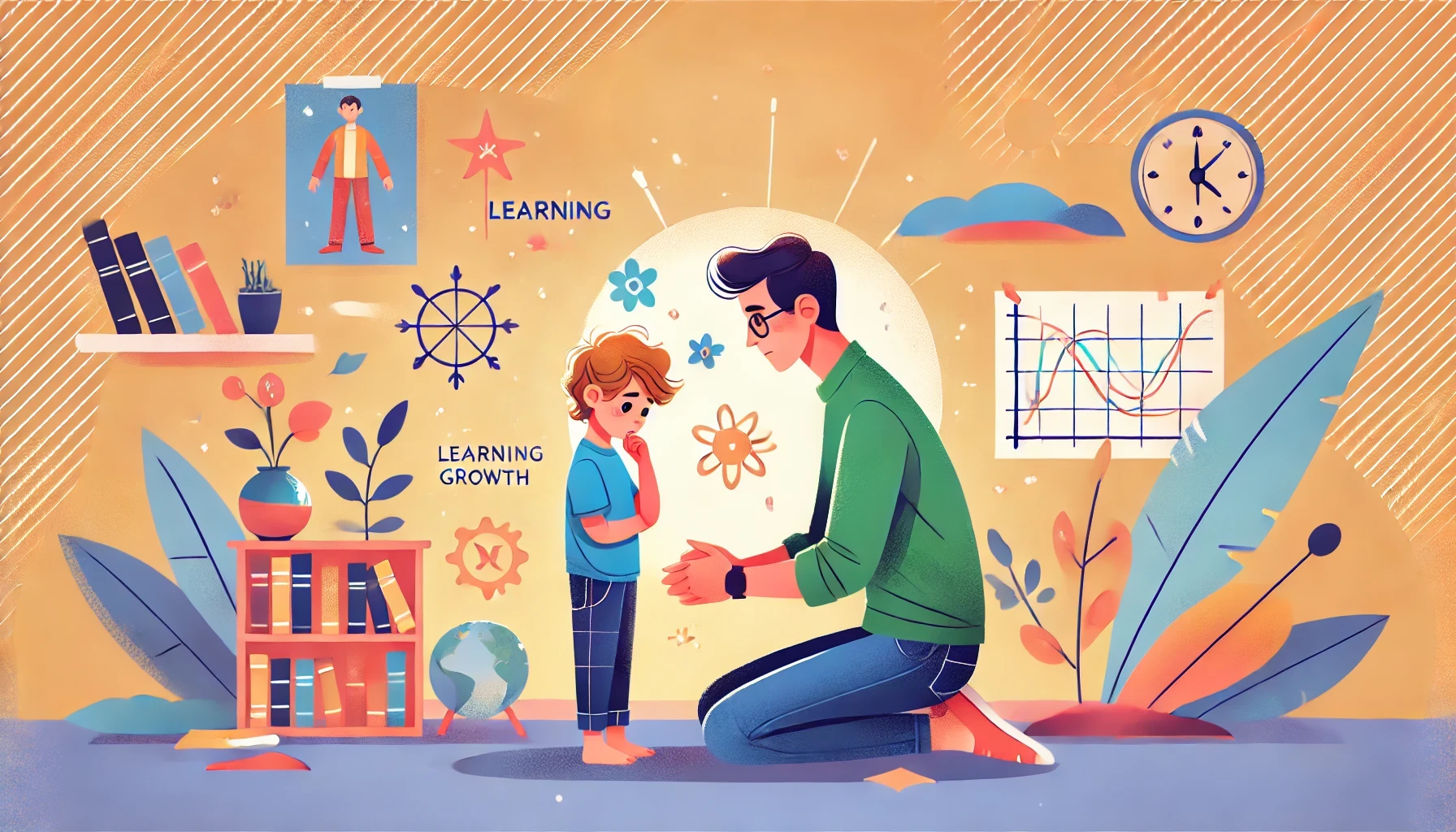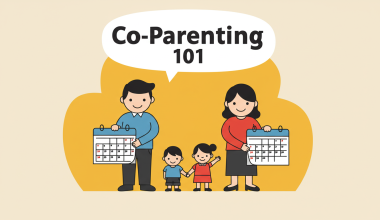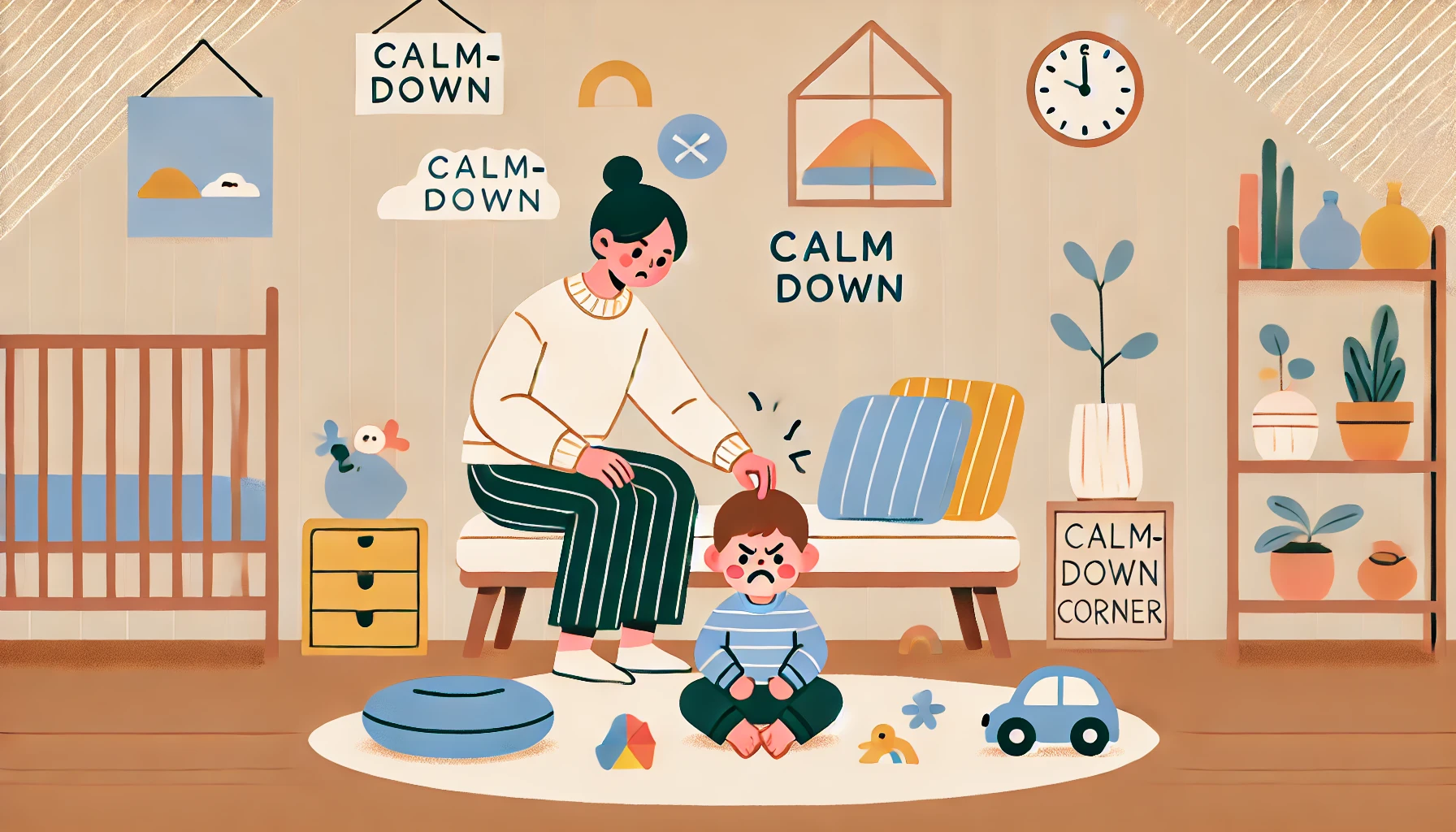What Do Puzzles Teach Children? Puzzles are a popular and engaging activity for children. They come in various forms and difficulty levels, making them suitable for kids of all ages. But beyond being fun, puzzles offer numerous developmental benefits.
Understanding “What Do Puzzles Teach Children” can help parents and educators utilize these tools to enhance children’s growth and learning.
Puzzles are important for child development because they help improve cognitive skills, physical abilities, emotional growth, and social interactions. From enhancing problem-solving skills to building patience, puzzles provide a comprehensive learning experience that can support various aspects of a child’s development
Cognitive Benefits
Understanding “What Do Puzzles Teach Children” reveals several cognitive benefits that contribute to a child’s development.
Problem-Solving Skills
Puzzles are excellent tools for teaching problem-solving skills. When children work on puzzles, they must think critically about how pieces fit together. They learn to use logic and trial-and-error to find solutions. This process enhances their ability to tackle problems and think creatively in other areas of life.
Memory Enhancement
Working on puzzles repeatedly helps improve children’s memory. As they remember shapes, colors, and pieces’ positions, their short-term memory gets a workout. This repeated practice of recalling and placing pieces strengthens their memory, making it easier for them to retain information in other learning contexts.
Attention to Detail
Puzzles require children to focus and pay attention to small details. As they search for pieces that fit, they learn to notice subtle differences and patterns. This attention to detail is a crucial skill that can help them in school and everyday life. By honing their observational skills, children become more adept at tasks that require precision and care.
These cognitive benefits demonstrate how puzzles can be powerful tools in a child’s developmental journey. Through problem-solving, memory enhancement, and attention to detail, puzzles teach children valuable skills that support their overall growth and learning.
Educational Benefits
Puzzles offer significant educational benefits, supporting various aspects of children’s learning and development.
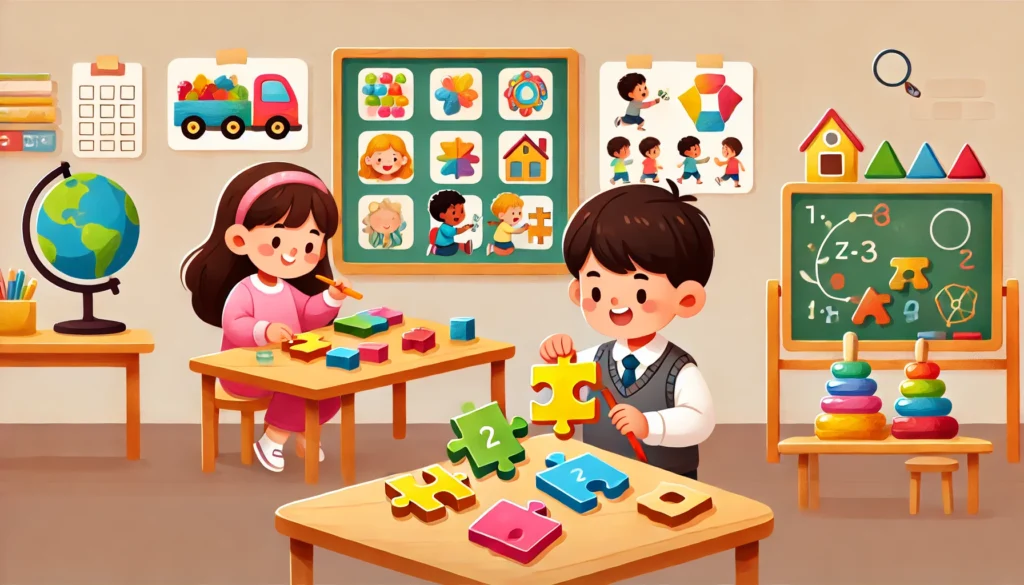
Language Development
Working on puzzles can enhance language skills. Discussing the puzzle pieces, images, and the process with children helps expand their vocabulary and improve communication skills.
Asking questions like “What do you see in this picture?” or “Can you find the red piece?” encourages children to articulate their thoughts and learn new words. This interaction promotes language development and helps children practice listening and speaking skills.
Early Math Skills
Puzzles also play a crucial role in developing early math skills. As children work on puzzles, they engage in shape recognition, spatial awareness, and pattern recognition.
Understanding how shapes fit together and recognizing patterns are foundational skills for geometry and other mathematical concepts.
For example, fitting a triangular piece into a matching space helps children understand the properties of shapes. Additionally, counting the number of pieces and sorting them by color or size introduces basic math concepts in a fun and engaging way.
Through enhancing language and early math skills, puzzles teach children critical educational foundations that will support their academic growth. Understanding “What Do Puzzles Teach Children” in the context of education highlights the value of incorporating puzzles into learning activities.
Visual and Spatial Reasoning
Puzzles are excellent tools for developing visual and spatial reasoning skills in children, which are essential for various aspects of learning and daily life.
Visual Perception
Puzzles significantly improve visual perception skills. When children work on puzzles, they need to recognize different shapes, colors, and patterns. This process helps them understand how individual pieces fit together to form a complete picture.
Developing visual perception is crucial for activities like reading, where children must recognize and differentiate between letters and words. It also aids in tasks requiring visual memory and the ability to make sense of visual information.
Spatial Awareness
Spatial awareness is another key skill enhanced by puzzle-solving. Children learn how objects relate to each other in space, which helps them understand concepts of distance, size, and position.
This skill is particularly important in mathematics, where spatial reasoning is necessary for understanding geometry and solving problems that involve visualizing shapes and their relationships.
By figuring out how pieces fit together, children develop an intuitive understanding of spatial concepts that will benefit them in both academic and real-world scenarios.
Physical Development
Puzzles offer significant physical development benefits for children, contributing to both fine and gross motor skills.
Fine Motor Skills
Manipulating puzzle pieces is an excellent way for children to develop fine motor skills. As they pick up, turn, and fit pieces together, they enhance their hand-eye coordination and dexterity.
These skills are crucial for tasks like writing, buttoning clothes, and using utensils. By working on puzzles, children strengthen the small muscles in their hands and improve their ability to perform precise movements.
Gross Motor Skills
Larger puzzles, especially floor puzzles, involve more substantial physical movement and help develop gross motor skills. These puzzles require children to use their whole body, often involving bending, reaching, and crawling to place pieces correctly.
This type of physical activity helps strengthen their larger muscle groups and enhances their overall coordination and balance. Understanding “What Do Puzzles Teach Children” in terms of physical development highlights how these activities support essential growth and motor function.
Emotional and Social Skills
Puzzles also play a crucial role in developing children’s emotional and social skills, contributing to their overall personal growth.
Patience and Perseverance
Completing a puzzle requires patience and persistence. Children learn to stick with a task until it is finished, even when it becomes challenging. This process teaches them the value of perseverance and helps them develop a resilient mindset. Understanding that some tasks take time and effort to complete is a valuable life lesson.
Self-Esteem and Confidence
Successfully completing puzzles gives children a sense of achievement. Each time they fit a piece correctly or finish a puzzle, they experience a boost in self-esteem and confidence. This sense of accomplishment encourages them to take on new challenges and builds their belief in their abilities.
Social Skills
Working on puzzles with others promotes teamwork and cooperation. When children work together on a puzzle, they learn to communicate, share, and help each other. This collaborative effort enhances their social skills and teaches them how to work as part of a team. They also learn to negotiate and respect different viewpoints, which are important social skills for their overall development.
Independent Play
Puzzles are an excellent tool for encouraging independent play in children, allowing them to develop important self-reliance skills.
Encouraging Independence
Puzzles provide a wonderful opportunity for children to entertain themselves and enjoy some quiet, focused time.
As they work on fitting pieces together, children learn to rely on their problem-solving abilities and critical thinking skills without needing constant adult intervention. This fosters a sense of independence and helps them become more self-sufficient.
When children engage in independent play with puzzles, they learn to manage their time and stay engaged in an activity on their own.
This not only helps build their concentration and focus but also gives them a sense of accomplishment when they complete a puzzle by themselves. Encouraging this type of play is beneficial for their overall development, as it teaches them to enjoy their own company and take pride in their achievements.
Understanding “What Do Puzzles Teach Children” in the context of independent play highlights the importance of providing opportunities for children to engage in solitary activities that promote self-reliance and resilience.
Additional Resources
Here are some recommended puzzles for different age groups and useful links to articles and books on the benefits of puzzles in child development.
Recommended Puzzles for Different Age Groups
For Toddlers (Ages 1-3)
- Melissa & Doug Pets 4-in-1 Wooden Jigsaw Puzzles: Simple and colorful puzzles with large pieces.
- Montessori Mama Wooden Toddler Puzzles: Designed for small hands, these puzzles help develop fine motor skills.
For Preschoolers (Ages 3-5)
- Melissa & Doug Solar System Floor Puzzle: Engaging and educational, teaching about planets while improving hand-eye coordination.
- Peaceable Kingdom Scratch & Sniff Puzzles: Multi-sensory puzzles that make learning fun and interactive.
For School-Aged Children (Ages 6-12)
- Begin Again Animal Parade A to Z Puzzle and Playset: Enhances problem-solving and creative thinking skills.
- Melissa & Doug Vehicles Sound Puzzle: Interactive puzzles with sound effects that add an extra layer of learning and fun.
For Older Kids (Ages 12+)
- YongnKids Amaze 3D Gravity Maze Ball Puzzle: A challenging puzzle that develops problem-solving skills and spatial awareness.
Final Thoughts
Puzzles offer a wide range of benefits for children’s development. They help improve cognitive skills by enhancing problem-solving abilities, memory, and attention to detail. Physically, puzzles develop both fine and gross motor skills. Emotionally, puzzles teach patience, perseverance, and boost self-esteem and confidence. Socially, they promote teamwork and cooperation.
Educationally, puzzles aid in language development and early math skills, while also enhancing visual perception and spatial awareness. They encourage independent play, helping children develop self-reliance and concentration.
Given these numerous benefits, it’s clear that puzzles are a valuable tool for supporting a child’s growth and learning. Parents are encouraged to incorporate puzzles into their child’s playtime regularly. By doing so, they provide their children with a fun and engaging way to develop essential skills that will benefit them throughout their lives.
